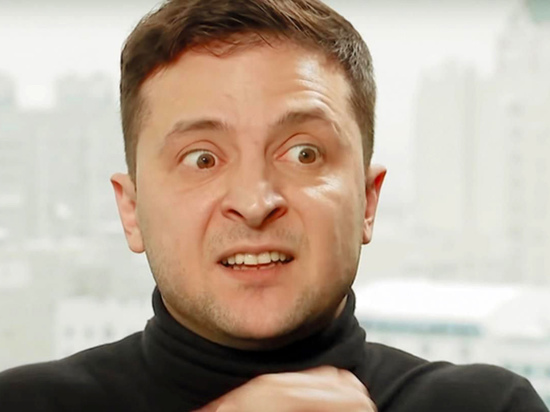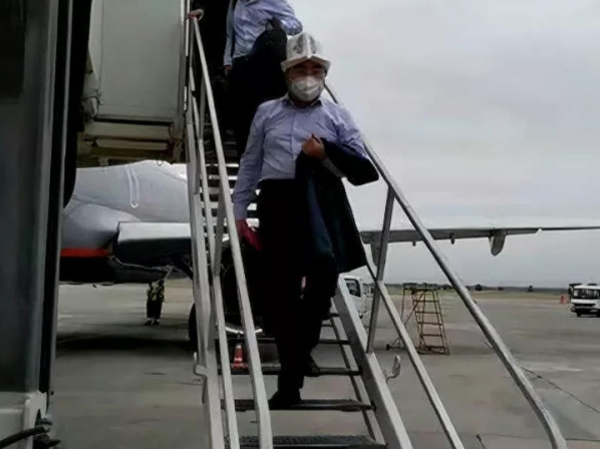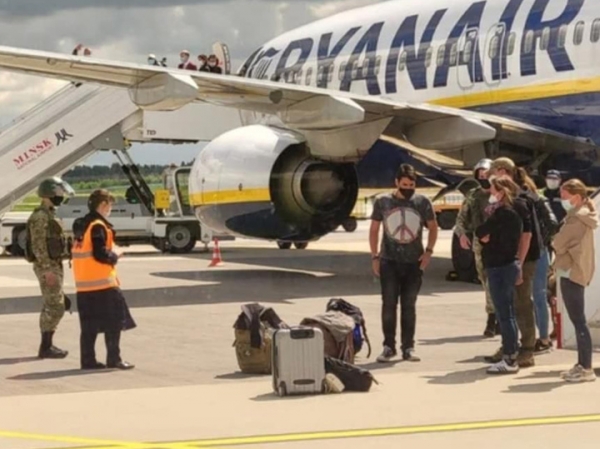What were the main events of 2021 in the countries of the former USSR
A difficult year is coming to an end, which in the post-Soviet space began with the cessation of the bloody conflict and the establishment of peace between Armenia and Azerbaijan, and ends with the expectation of a new war — between Ukraine and Russia. If you look at the map of the CIS, few of the countries passed it easily — in a stable and confident environment. Even Asian statesshaken: the crisis in Afghanistan has affected the situation in these seemingly calm republics. What can we say about Ukraine with its chronic political tremor, post-war Armenia, Moldova at a crossroads or Belarus, which is subject to sanctions. The rating of the most pronounced results of the year is in the material “MK”.

Zelensky’s facial expressions began to surprise. Photo: A frame from the video
The fall of the year
By the end of 2021, the rating of the President of Ukraine, Vladimir Zelensky, collapsed again. What kind of political somersault the former actor-comedian will make in 2022, no one now fully understands — while the arrest of Petro Poroshenko’s predecessor as a “traitor to the motherland” and an attempted coup in relations with Russia are being viewed in January, but this is not accurate.
A year ago, Zelensky entered the new season with a rating that also collapsed to 20%, in January 2021, the Ukrainian authoritative Kiev International Institute of Sociology (KIIS) claimed that 19.2% of Ukrainians who had already decided on a choice were ready to vote for the current president. Then Zelensky came out of the electoral disaster, riding a patriotic agenda, — since February, he began to collect the NSDC andto punish with the help of this illegal mechanism simply by his decrees everything “pro-Russian”: he closed the pool of Viktor Medvedchuk’s TV channels, opened a criminal case against the oligarch himself and by May sent the politician under house arrest, where the leader of the party “Opposition Platform for Life” continues to be until now. Against this background, little by little, but confidently, Vladimir Zelensky’s rating grew to 32% by the summer.
Now Ukrainian patriots have also become disillusioned with Zelensky. The rating has literally rolled down since the president of Ukraine also entered into a hot war with the richest Ukrainian Rinat Akhmetov, and therefore with his highest-rated Ukrainian TV channels. There are three topics on Ukrainian TV right now: the upcoming energy crisis by February, rising prices and a possible war with Russia.
It is already known that on New Year’s Eve Vladimir Zelensky will light up twice in the congratulations of the people and at the New Year’s concert of his humorous Studio Kvartal-95. Political scientists are already betting on the topic of “whether the surname of Poroshenko will sound in the New Year’s greetings of the Ukrainian president”. Most people think so. And 2022, through the efforts of political technologists of the Office of the President of Ukraine, will give Vladimir Zelensky new enemies, and this time it will not be pro-Russian parties and politicians.
“The drop in Zelensky’s ratings cannot be called unexpected, if only because Ukrainian political traditions consist in a drop in the level of support for any government,” says Enrique Menendez, a Ukrainian political scientist, head of the analytical center “Donbass Institute of Regional Policy.” But if we look for a rational explanation, thenseveral explanations come to mind at once. Firstly, the decline in the standard of living of ordinary Ukrainians. Despite the fact that Zelensky is not at all to blame for it. But he promised “the end of the era of poverty”. High inflation, rising tariffs and the lack of real economic growth are factors that will be in effect for a long time, and any government will have to reckon with them.
Two other reasons stand apart: the first is the failure of the sixth president of Ukraine to fulfill his main election promise to end the war in Donbass through negotiations. In any opinion poll, this is the country’s number one problem. The lack of progress in a peaceful settlement is obvious to everyone, and it is not always possible to shift responsibility to Russia.
Secondly, Zelensky was voted for en masse as a president who would bring unity to the country and crack down on the old elites. But neither the first nor the second happened. Petro Poroshenko’s course of aggressive Ukrainization continued, which the voters of the south and east of the country do not like. And the request for social justice was not crowned with either loud landings or changes in the essence of politics. It’s just that now new faces are already associated with corruption.
World of the Year
In November 2020, the second Karabakh war was over. The peaceful year that followed became a crisis year for Armenia. It started with the fact that some buried their children who died in the 44-day war for Karabakh, while others tried to overthrow Prime Minister Nikol Pashinyan. However, early parliamentary elections were held in Armenia in the summer, in which Pashinyan’s Civil Contract still received the majority of votes. Now, unless something extraordinary happens, he will rule the republic for another 5 years. But ex-President of Armenia Robert Kocharian, who almost ended up behind bars before the war, was able to get into parliament.
“Many analysts assumed that Pashinyan would be able to win the elections. Moreover, the elections were held precisely for the reason that the authorities were confident in the chances of Pashinyan and his team for legitimization. Now they can say that they have an updated mandate of trust. But so far it cannot be said that Pashinyan has restored hislegitimacy. Armenia returned to the situation before 2018, when there was a weak government and a weak opposition. A little more than half of the voters did not participate in the elections, and about 20% of those who voted chose parties that were known in advance that they would not be able to be elected,” Alexander Iskandaryan, head of the Caucasus Institute, told MK.
While Armenia was deciding who was in power and who was a traitor, Azerbaijan began unilaterally “clarifying” the border with its neighbor. From May 12 until the end of 2021, the Azerbaijani army took control of over 41 square kilometers of territories that Yerevan considers its own. We are talking about reservoirs, pastures, dominatingheights and so on. After each new lost piece of land, the opposition accuses Pashinyan of not being able to protect the territorial integrity of the republic. In response, he tries to appeal to Russia, which, according to him, should help protect the Armenian borders within the framework of bilateral agreements and the CSTO.
But the most difficult situation is in Artsakh (the Nagorno-Karabakh Republic), or what is left of it, Stepanakert and several districts with villages. According to the agreement signed on November 9, 2020, the Armenian side withdrew all heavy equipment from there and no longer sends its army there. There are Russian peacekeepers on the perimeter of the self-proclaimed republic, who make sure that the Azerbaijani troops do not solve the Armenian issue in the same way as they solve the border issue with Armenia.
“After the end of the war, relations between Armenia and Azerbaijan develop quite naturally. Baku is trying to choose all the positive results of the war for itself as much as possible. He puts pressure on Yerevan with statements that the Karabakh problem no longer exists, accusing Russia of the fact that the peacekeepers are interferingto settle the Karabakh issue. Although how can it be if it has already been resolved? Armenia has few trump cards, but the process of settling is underway and may take quite a long time. The main reason for this is the suspended state of Karabakh,” Iskandaryan said.
President of the Year
At the beginning of this year, on January 10, 2021, a new president appeared in Kyrgyzstan. During the early elections, Sadyr Zhaparov, released from prison, became the head of state. The Deputy chairman of the Eurasian Generation Foundation, political scientist Igor Shestakov, told about what he managed to bring to the development of the country over the past year:
Of course, this year the largest systemic changes have taken place in Kyrgyzstan, that is, we have moved from a parliamentary republic to a presidential one. In fact, Sadyr Zhaparov put an end to the populist experiment of reformatting the country’s political system into a more realistic format. If we look at successful countries, including in the CIS, these are primarily countries with a presidential form of government.
Moreover, strengthening the role of the president in the country was the initiative of not only Zhaparov himself. This was the desire of many Kyrgyzstanis who wrote about it in social networks when they saw the complete collapse of the parliamentary form of government. The parliament and the government formed by it could not solve the health problems in 2020, they did nothing to make the country pass the covid period with the least losses.

Under President Zhaparov, the first head of Kyrgyzstan, Askar Akayev, was able to fly to his homeland. Photo: press service of the State Security Committee of the Kyrgyz Republic
Throughout the year, the country has faced serious socio-political challenges, because economically we are still in a very difficult situation. We have held five elections in a year, we can say that the electoral cycle was the most active in all the years of Kyrgyzstan’s independence. The last parliamentary elections were expected fromThere was great concern not only in the country itself, but also external wariness on the part of our main partners, including Russia. Zhaparov maximally reduced the influence of the administrative resource and set a clear task so that there was no bribery of voters. As a result, the protest potential after the elections is at zero.
As for corruption in the country, this topic remains relevant throughout the 30 years of independence. There were loud landings under Zhaparov. But, of course, the fight against corruption does not depend only on the president, we need strong public support.
Sanctions of the year
After the presidential elections in Belarus, the country fell under Western sanctions. But it turned out that this is not the limit. The forced landing of the Rayanair plane at Minsk airport caused a new wave of sanctions. Which this time affected the import of potash fertilizers and petroleum products. And the sky over Belarus was completely closed, because Europe banned flights in Belarusian airspace.
In June of this year, another, fourth package of personal sanctions followed from the West, which affected the inner circle of Alexander Lukashenko and himself. And finally, the migration crisis that unfolded on the border of Belarus with the Baltic states and Poland led to the fifth package of sanctions against individuals, as well as major companies, including Belavia, Belorusneft, Belshina, Grodno Azot, and even special forces of the Belarusian border troops.

The landing of the Ryanair plane in Minsk was the reason for the next sanctions. Photo: twitter.com
In response to these actions, Belarus rolled out its sanctions against the European Union, as well as the United States, Canada, Great Britain and other countries. The restrictions affected the importation of products from these countries, including meat, milk, sausage, vegetables and fruits. Summing up all these events, of course, Belarus can be considered a country that in 2021 found itself under the strongest sanctions pressure.
MK talked about this with economist Yaroslav Romanchuk:
The Belarusian authorities, on the one hand, were helped by Moscow’s support, both diplomatic and resource. On the other hand, there is an unprecedented demand from foreign markets for raw materials that Belarus traditionally exports: petroleum products, chemical goods, metals, agricultural products. Therefore, despite the sanctions that were imposed in December 2020, in June and December 2021, exports of goods to the European Union doubled. In addition, the budget was balanced, a trade surplus was achieved, and the Belarusian ruble exchange rate even slightly strengthened.
Yes, the Belarusian authorities have classified almost 35% of the statistics on exported goods, and prices are managed manually. But it is impossible to say that Belarusians began to live worse in gross terms, because there was really more money in the country.
But this combination of circumstances, which was in the hands of Alexander Lukashenko, will be impossible to reproduce in 2022. Moreover, it is quite obvious that the outflow of human capital and the shortfall in foreign investment has accelerated. And sanctions against large industrial enterprises will begin to act more harshly in 2022. In 2022, the country’s economy will be in a state of stagflation, that is, stagnation and high inflation, which in 2021 is around 10%.

